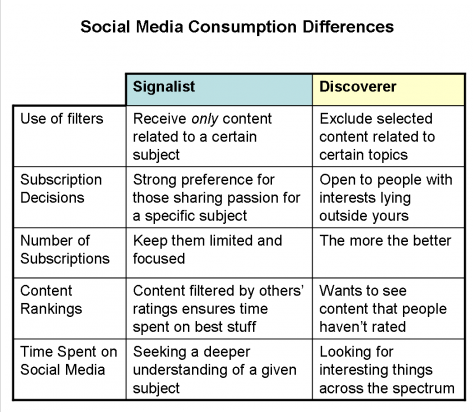Blogs, RSS, IM, Twitter and FriendFeed – the number of sources of sources of information online can feel like it’s multiplying exponentially every day. It’s easy, natural even, to feel overwhelmed. Especially when we are more familiar with the tightly controlled editorial policies of mainstream media.

The social media space is noisy, though. There are many times when filtering that noise effectively makes a lot of sense (some tools discussed below) – but there are also many times when noise is just what we need.
Experiments in Noise Control
There are many ways you can roughly cut down on the noise in your information stream. More emerge all the time and this is a very valuable direction for services to be exploring. We don’t want to argue that noise is always good, it’s clearly important to spend some time without it every day.
The most recent entry into the noise filtering scene is probably FriendFeed’s new “best of” feature. Late last night FriendFeed rolled out the ability to view just the items most popular with your friends on the service for the last day, week or month. It’s something many people have been hoping for and there’s no doubt it will prove useful. If you’re not using FriendFeed yet, you can check it out and add me as a friend if you like here.
Other services that are good for filtering out noise are del.icio.us popular for a particular tag, AideRSS and Google Reader’s overly friendly shared items from friends feature. We’d love to read about your favorite noise filtering tools in comments below.
One way to break down two ends of the spectrum, by Hutch Carpenter. Of course most of us jump from one end to the other and live somewhere in between.

On the Beauty of Noise
Filtering isn’t everything it’s cracked up to be, though, and you wouldn’t want to live in a fully filtered world all the time. Social media noise is an essential part of learning and living on the web. Hear are some reasons why.

Unexpected opportunities.
Some people call it “serendipity,” others call it “passive and opportunistic information acquisition.” (Erdelez, see below.) The less limited the boundaries of your scope of view are, the more likely you may be to find things you didn’t even think to look for.
Scanning quickly over large quantities of roughly relevant information can turn up invaluable resources, opportunities, context and contacts that you can passively process or opportunistically leverage at will.
Future Needs
It’s one thing to find something you didn’t know you needed right now, it’s a whole other skill to be able to recall information that seemed marginally useful at best in the past at a time in the future when the need for it arises. Who can’t remember doing that before?

The ability to recall passively collected information that was gathered purposelessly in the past and put it to use in the future is a particularly powerful form of intelligence. A person with a substantial reservoir of generally relevant information is a great person to have on any team.
Maximizing Recall
Some people worry that being exposed to too much information will lead to not remembering very much of it. Scientists say that’s not necessarily the case, though. Sanda Erdelez, for example, wrote the following in her study Information Encountering: It’s More Than Just Bumping into Information
A majority of participants in my information encountering study, when asked about their past experiences of “bumping into information,” were familiar with the notion of accidental discovery of information and could recall these experiences clearly.
We may be afraid that we won’t remember key information that rushed past us in a river of news, but Erdelez argues that when prompted about a particular incident of accidental discovery our memories are better than we might think.
We would argue here in fact that the more total information our minds are exposed to, the more particular items we’ll be able to recall in the future. One useful strategy may be to spend some time going through a large amount of information just a touch more quickly than we’re comfortable with.
General Knowledge
Beyond simple recall of particular information in the past, internalized noise can be just as useful in the formation of wisdom and perspective as introspection, thoughtfulness and other forms of attentiveness can be. Spend some time skimming, it’ll make you a better person. You’ll meet new people, learn new things – don’t worry, it’s fun.
Personal Growth
Serendipitous search in the offline world is believed to be one of the ways our understanding of the world expands. David Pescovitz at BoingBoing writes about Swedish ethnologist Erik Ottoson’s PhD thesis titled Seeking One’s Own: On Encounters Between Individuals and Objects:

“Ideals of what is beautiful, useful and reasonable,” Ottoson argues “materialize in conjunction with the experience of what is available and what is absent or out of reach.”
That’s more than just a beautiful reason you should read BoingBoing, it’s an interesting understanding of the way that swimming through noise helps us become who we are.
Conclusion
Quiet time, time off-line, deep thoughts and long books are all beautiful things – essential to a healthy intellectual, psychological and social life. We argue, though, that the opposite of all those things – online social media noise, is also a great opportunity that deserves to have its worth recognized at a time in history when many of us are struggling to deal with it.
So take some time for yourself when you can, find a nice place to sit with a cup of tea and blow through a few hundred items in your RSS reader. If you can relax into it, it’ll help you remember some of the reasons why you love the internet.
Creative Commons photos, Christmas 2007 series, by Flickr user Kevin Dooley.

















